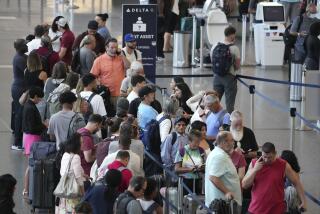Skype blackout due to surge of reboots
- Share via
A two-day outage that left millions of Skype users unable to use the popular Internet phone service was caused by an abnormally high number of restarts after people had downloaded a Windows security update, the company said Monday.
The worldwide outage, which began Thursday and ended Saturday, left millions of Skype users unable to log on to make phone calls or send instant messages.
Luxembourg-based Skype Ltd., part of online auction giant EBay Inc., has more than 220 million users in total but says it typically has 5 million to 6 million users online at any given time. In January, Skype reported it had counted a high of 9 million users online at one time.
In an update to users on Skype’s Heartbeat blog, employee Villu Arak said the disruption was not caused by hackers or any other malicious activity.
Instead, he said, the disruption “was triggered by a massive restart of our users’ computers across the globe within a very short time frame as they rebooted after receiving a routine set of patches through Windows Update,” Arak wrote.
Microsoft Corp. released its monthly patches last Tuesday, and many computers are set to automatically download and install them. Installation requires a computer restart.
“The high number of restarts affected Skype’s network resources. This caused a flood of login requests, which, combined with the lack of peer-to-peer network resources, prompted a chain reaction that had a critical impact,” Arak wrote.
Arak did not blame Microsoft for the troubles and said the outage ultimately rested with Skype. Arak said Skype’s network normally had an ability to correct itself in such cases, but a previously unknown glitch in Skype’s software prevented that from occurring quickly enough.
“This disruption was unprecedented in terms of its impact and scope,” Arak wrote. “We would like to point out that very few technologies or communications networks today are guaranteed to operate without interruptions.”






